Partner interview: Uli Huener of EnBW on digitization, transformation & the energy transition
‘We are living the change – the course for change has been set. We’re fully aware of how important innovations are for our future’, as Uli Huener emphasises in our interview. Uli Huener is Head of Innovation Management at EnBW Energie Baden-Württemberg AG. This year, EnBW is the new partner of CODE_n, the ecosystem designed to network digital pioneers.
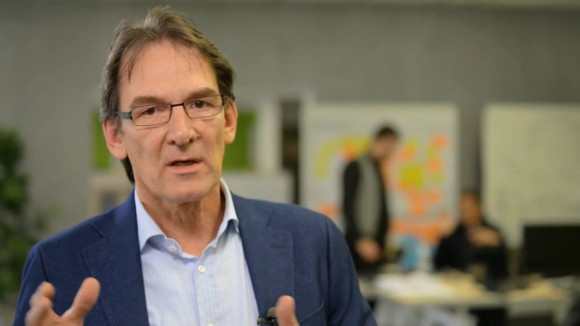 Mr Huener, the energy industry in Germany faces major challenges in implementing the energy transition, not only technologically but also economically. What is your assessment of the pressure for change?
Mr Huener, the energy industry in Germany faces major challenges in implementing the energy transition, not only technologically but also economically. What is your assessment of the pressure for change?
Uli Huener, EnBW: For the energy sector, the extent of anticipated change and need for transformation is unprecedented: there are social and fundamental market changes occurring simultaneously. This places strong pressure on the business models that have historically characterised the energy industry. In addition technology trends such as digitalization, increasing device connectivity / machine to machine communication put pressure on the existing utility business. Classic customer-supplier relationships are changing drastically, revolutionising the industry across the existing value chain.
Revolution is a good keyword. Where does EnBW stand today in this regard?
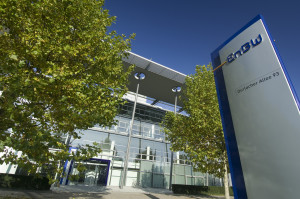 Uli Huener, EnBW: EnBW is currently in the midst of this transformation. The road is long and at times winding, but there is no alternative. We must rethink business models and processes down to their roots and venture forth along new paths. We have set clear goals and tasks for ourselves with our ‘EnBW 2020’ strategy. One main pillar of our strategy is customer focus – for energy solutions and product innovations with genuine added value and real participation opportunities.
Uli Huener, EnBW: EnBW is currently in the midst of this transformation. The road is long and at times winding, but there is no alternative. We must rethink business models and processes down to their roots and venture forth along new paths. We have set clear goals and tasks for ourselves with our ‘EnBW 2020’ strategy. One main pillar of our strategy is customer focus – for energy solutions and product innovations with genuine added value and real participation opportunities.
Let me use a simple comparison: In the recent past, customer contact for power utilities was typically limited to the annual electricity bill and the submission of meter readings. Our objective must be not only to increase the number of contacts but, more importantly, to change the nature of these customer contacts. Take the financial sector, for instance, where the ‘Venerable’ monthly account statement no longer constitutes the sole point of contact a bank has with its customers. Today, the usability and functionality of an online banking tool are a decisive factor in consumers’ choice of a financial institution. Applied to the energy industry, this lesson offers utilities real opportunities to reposition themselves in the marketplace. Naturally, any company that offers smart products such as Smart Home is going to need digital services as well – the two factors must go hand in hand. And change and networking become all the more necessary the more global corporations such as Google, Amazon and Apple become involved in the energy sector.
That sounds like a lot of work. Looking five years ahead – where will EnBW be in 2020?
Uli Huener, EnBW: To successfully shape the future, we must further diversify our business, and depending on the business model involved we need to join forces with partners from IT, analytics, telecommunications, software, hardware/sensor technology and storage technologies, but also with traditional customer segments such as municipalities. We need to work on solutions together.
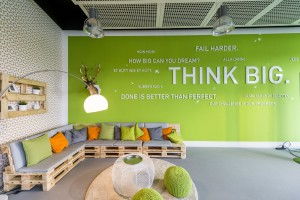 The transition sets our agenda in cultural terms, too. Our new Innovation Campus in Karlsruhe is at the heart of our innovation strategy. There, we are systematically working on new products and services based on a start-up approach, trying out lots of new things and networking in ways that are largely independent of the Group. All EnBW staff can propose their own ideas, symbolically ‘moving on campus’ where they are then assisted with further developments by the innovation team in place there. Two examples of the ideas the new think tank has devised are Sm!ght, the intelligent street light, and Em!l, the intelligent concept for energy management in the home.
The transition sets our agenda in cultural terms, too. Our new Innovation Campus in Karlsruhe is at the heart of our innovation strategy. There, we are systematically working on new products and services based on a start-up approach, trying out lots of new things and networking in ways that are largely independent of the Group. All EnBW staff can propose their own ideas, symbolically ‘moving on campus’ where they are then assisted with further developments by the innovation team in place there. Two examples of the ideas the new think tank has devised are Sm!ght, the intelligent street light, and Em!l, the intelligent concept for energy management in the home.
The bottom line: By 2020, EnBW will be a completely different company. We already changed course in summer of 2013 with our strategic realignment, setting fixed business objectives and clearly committing ourselves to the energy transition. With this new course, we open up new options for long-term growth. This line-up is characterised by expansion in renewable energies, the necessary transformation of our grids that this involves, and the expansion in our services “close to the customer”. We firmly believe that we will find a place in the new energy world.
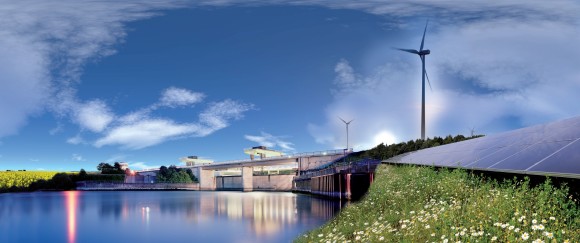
What added value do you expect the exchange and cooperation with start-ups to offer for big company like EnBW?
Uli Huener, EnBW: An enormous amount! New areas for the future, such as energy management, virtual power plants, electromobility, the smart home and the smart grid bring additional challenges. The proportion of the energy-industry-specific skills is becoming smaller, while different skills – in the IT sector in particular – are becoming critical to success. In future, more than ever before, we will need a blend of in-house know-how, external expertise to support or outsource individual components, and solid partners. We will definitely not be able to go it alone. Cooperation with start-ups is a key driver of innovation. 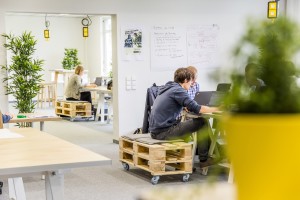 In addition to the commitment from within, we also need a culture of open innovation. We already have crowdfunding, crowdsourcing and friendly user tests in progress at various points in use – but our effort will expand beyond this. Yes, we also have our eyes on other developments in the market. It is important to introduce EnBW to the capabilities that start-ups have to offer. Young companies, too, benefit if a company with 5.5 million customers opens itself up to their ideas and gives them room to market components or even their own products. We offer project teams a place where they can evolve. We combine the skills of both worlds, with the aim of getting a better grip on the business fields of tomorrow.
In addition to the commitment from within, we also need a culture of open innovation. We already have crowdfunding, crowdsourcing and friendly user tests in progress at various points in use – but our effort will expand beyond this. Yes, we also have our eyes on other developments in the market. It is important to introduce EnBW to the capabilities that start-ups have to offer. Young companies, too, benefit if a company with 5.5 million customers opens itself up to their ideas and gives them room to market components or even their own products. We offer project teams a place where they can evolve. We combine the skills of both worlds, with the aim of getting a better grip on the business fields of tomorrow.
What characteristics should start-ups have to offer, in your view?
Uli Huener, EnBW: I’m of the same view as Ben Horowitz, Partner at the Adreessen Horowitz venture capital firm, who after extensive research identified three characteristics for leaders of successful start-ups:
- The ability to develop and articulate a vision.
- A special form of ambition.
- The competence it takes to turn the vision into a reality.
By the way, I warmly recommend his book, The Hard Thing about Hard Things: Building a Business When There Are No Easy Answers, to anyone embarking on a start-up, and to every manager.
Mr Huener are you sometimes worried about the pace of digitization?
Uli Huener, EnBW: Actually, speed causes a dilemma, because there is a risk between strategic maturity and operational agility: The world keeps turning and doesn’t wait until a business strategy is complete or a new business unit has been set up. But responsiveness and speed are critical to success. This is true in almost all dimensions of an organisation – that is, for the skills involved in entering into new partnerships, in thinking from the customer’s point of view, or in positioning IT as a business enabler. This is an area in which partnerships with start-ups of can be of immeasurable value. In contrast to large corporations, young entrepreneurs approach things from a different mind-set and are not subject to the usual standards in play in a corporate group. ‘All life is problem-solving”, as philosopher Karl Popper succinctly put it. Start-ups question EVERYTHING and EVERYONE – and they are also more agile, more creative and faster to act. They actively seek problems – the more difficult the challenge, the greater the motivation.
The theme of this year’s CODE_n CONTEST at CeBIT is the Internet of Things. In what areas of IoT you see opportunities for new business models at EnBW? Is IoT far enough along yet that it can be used to conduct business?
Uli Huener, EnBW: We’re living in the midst of the 21st century – almost everything communicates with everything else. This presents tremendous opportunities and points of departure for new business models. IoT is the next wave of digitization. In my view, the business models here are still in their infancy, yet they are also promising. We see opportunities in the energy sector particularly in the areas of connectivity and sensor technology, and in analytics and processing of data to create new customer services. We also view strategic partnerships between IoT start-ups and large corporations as the key to successfully placing new products and services in the digital environment in the market. With more than 100 years of energy expertise, a portfolio that spans the entire value chain for the energy industry, an open corporate culture, 5.5 million customers and 20,000 dedicated employees, here, too, we are also ready for new partnerships and ingenuity.
What specifically awaits visitors at the EnBW stand in the CODE_n Hall at CeBIT? Is there anything you can reveal here?
Uli Huener, EnBW: Naturally I don’t want to disclose too much, but I can say this much: we are continuing the thought of our ‘Innovation Campus’ and will bring a creative workshop along with us. So anyone who would like a hands-on experience is welcome to visit us and screw, drill and grind – on the energy transition.
So let me issue one last invitation in conclusion: come see us in CODE_n Hall and discuss, question and think things through, for new and innovative products in the energy world!


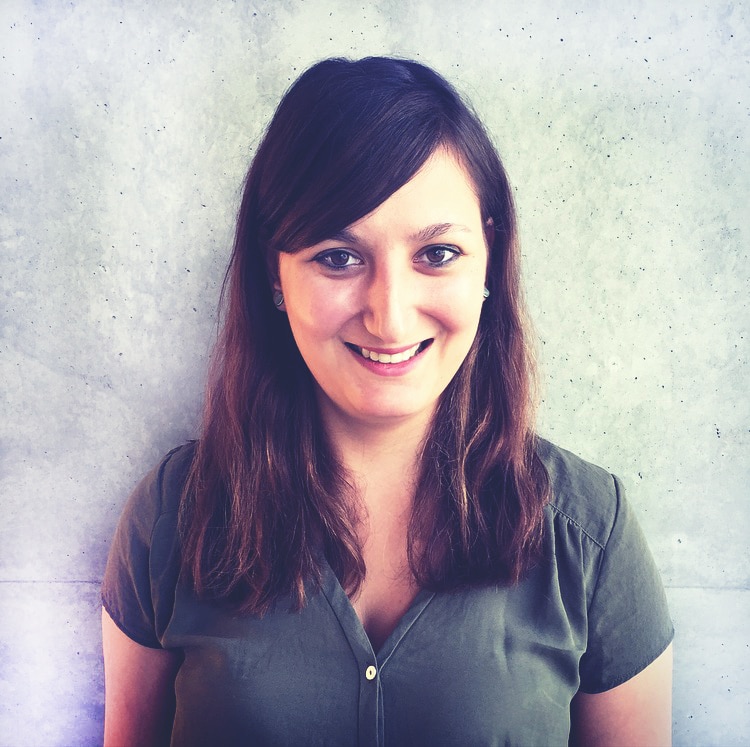
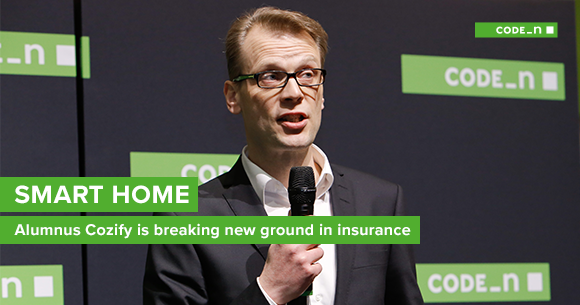
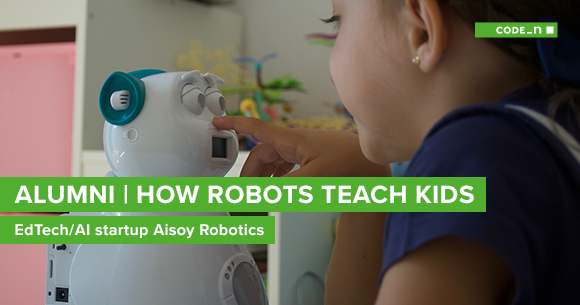
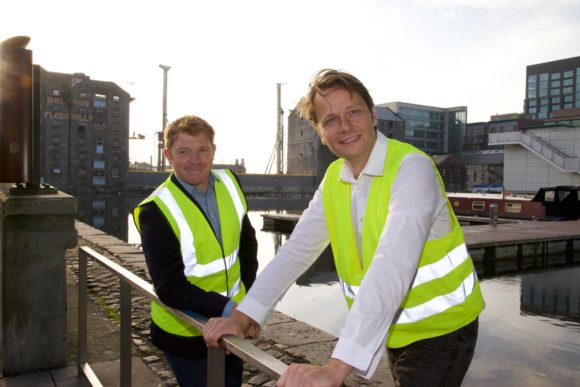
Write a comment